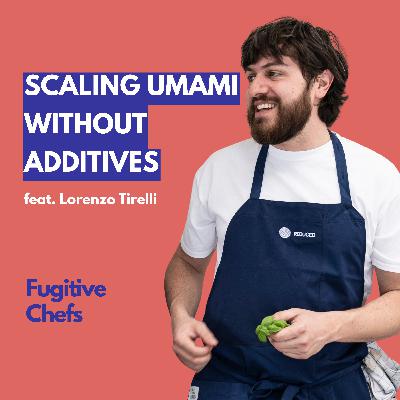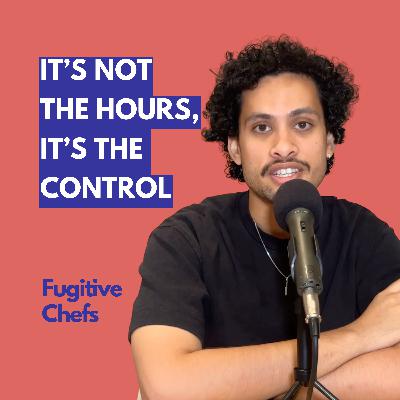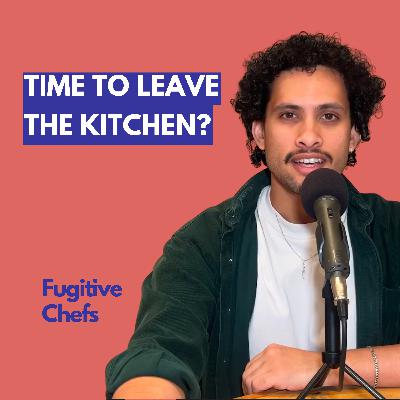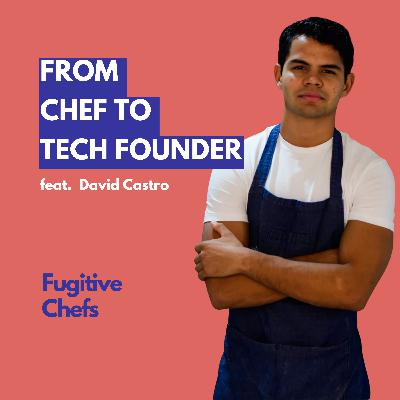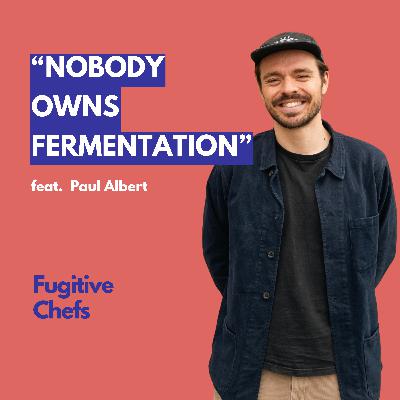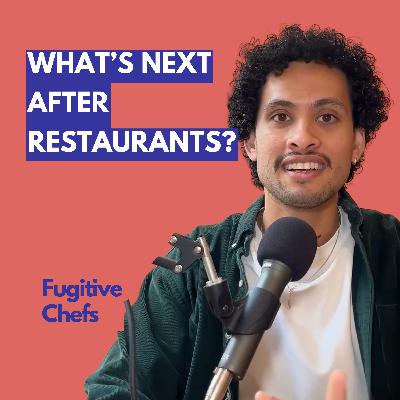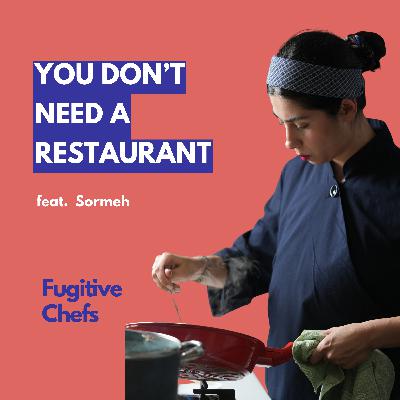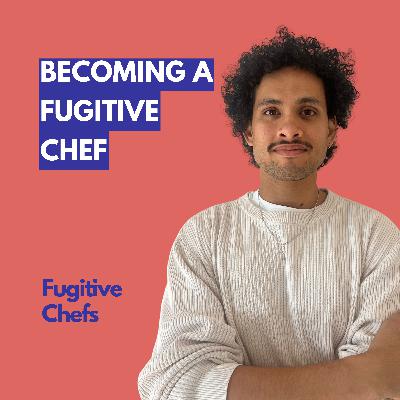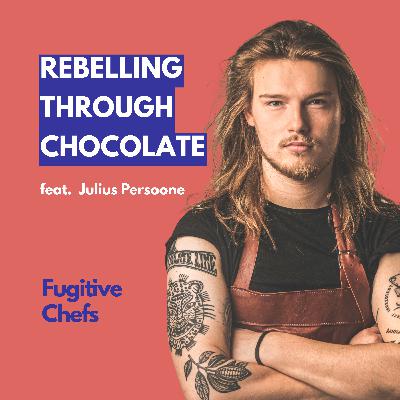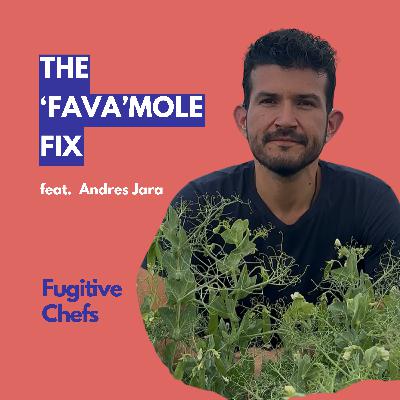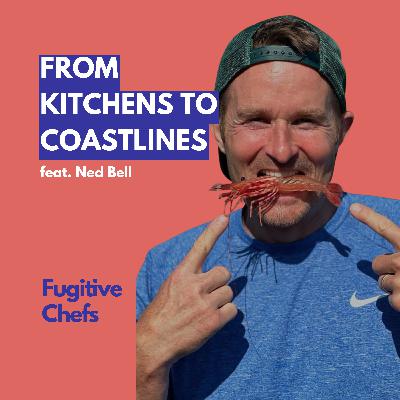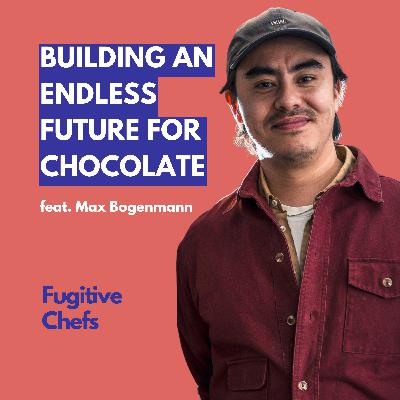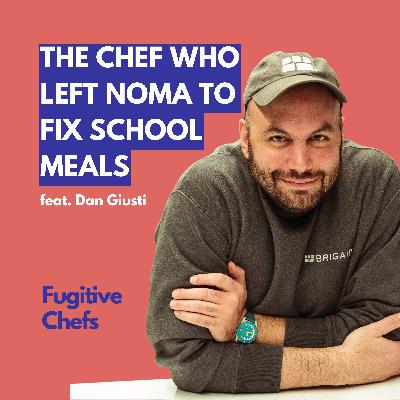Discover Fugitive Chefs
Fugitive Chefs

Fugitive Chefs
Author: Furqan Meerza
Subscribed: 4Played: 32Subscribe
Share
© Furqan Meerza
Description
I’m Furqan Meerza, a chef who worked in some of the world’s top kitchens, including Mugaritz and Noma.
Like a lot of chefs, I hit burnout. And I realized I needed a different way to stay connected to food; one that didn’t cost me my health or identity.
Fugitive Chefs is a podcast for chefs and food creatives who still love this craft, but need change.
Each episode features honest conversations with those who’ve stepped away from the traditional kitchen and into something new, from fermentation and R&D to storytelling, drinks, food culture, and more.
Like a lot of chefs, I hit burnout. And I realized I needed a different way to stay connected to food; one that didn’t cost me my health or identity.
Fugitive Chefs is a podcast for chefs and food creatives who still love this craft, but need change.
Each episode features honest conversations with those who’ve stepped away from the traditional kitchen and into something new, from fermentation and R&D to storytelling, drinks, food culture, and more.
49 Episodes
Reverse
Estefanía Simon-Sasyk is a Michelin-trained chef who led kitchens across continents before moving into strategic consulting, food innovation, and systems thinking.She has worked with institutions like the WTO and the Inter-American Development Bank, and founded Mycelium — a global network connecting chefs, scientists, and industry leaders.This episode explores:How kitchens can be both refuge and addictionWhy she left restaurants after 13 yearsWhat education actually does (and doesn’t do) for chefsWhy “university is not a product”The role of chefs in policy and corporate innovationWhether food companies can drive positive changeWhy innovation is about systems — not trendsThis isn’t a story about burnout.It’s a conversation about scale, agency, and what chefhood looks like when it expands beyond restaurants.👇 If you’re a chef navigating your next move:What do you think chefs are uniquely positioned to contribute outside kitchens?🎧 Fugitive Chefs explores alternative culinary careers and food system transformation.New episodes every Tuesday.🌐 Website & community: https://www.fugitivechefs.com📸 Furqan’s Instagram: https://bit.ly/4dtiyTv🎧 Podcast Instagram: https://bit.ly/43ndATO🎵 Spotify: https://spoti.fi/3F6j25A🍏 Apple Podcasts: https://apple.co/43vBtbT
Many chefs who want to leave restaurants end up asking the same question:“Do I need to study again to work in food innovation, R&D, or the food industry?”In this solo episode of Fugitive Chefs, Furqan breaks down why degrees feel like the default answer — and what they realistically can and cannot prepare you for.Having worked in fine dining at Noma and Mugaritz, then in food innovation and R&D at the Basque Culinary Center, Furqan reflects on education from inside the system — including the fact that he never formally studied there, yet was hired.This episode covers:Why chefs turn to degrees when leaving restaurantsWhat food, gastronomy, and innovation programs actually provideThe problem with vague promises like “Head of R&D” after one-year mastersCareer endpoints vs starting positionsWhy education opens doors but doesn’t guarantee readinessWhy many chefs feel unprepared even after studyingWhat to do if you can’t afford expensive degreesThis is not about ranking schools or discouraging education.It’s about clarity, expectations, and access.👇 Join the conversationIf you’re currently studying, considering a degree, or feeling unsure about what your program is preparing you for, leave a comment:What program are you in (or looking at)?What do you hope it will unlock?What still feels unclear?🎧 Fugitive Chefs is your window into alternative culinary careers and the food system beyond restaurants.New episodes every Tuesday.🌐 Website & community: https://www.fugitivechefs.com📸 Furqan’s Instagram: https://bit.ly/4dtiyTv🎧 Podcast Instagram: https://bit.ly/43ndATO🎵 Spotify: https://spoti.fi/3F6j25A🍏 Apple Podcasts: https://apple.co/43vBtbT▶️ YouTube: https://www.youtube.com/@fugitivechefs
What does a chef become when the kitchen is no longer the end point?In this episode, I sit down with Ryan Walker, formerly of SILO and now co-founder of Flux Fermentation, to talk about translating chef skills into food systems, R&D, and fermentation beyond restaurants.We explore how zero-waste thinking scales, why chefs are uniquely trained to work under constraint, and what actually changes when you move from service to industry-facing work.This conversation is for chefs who:Feel curious about R&D, fermentation, or food systemsAre questioning restaurant life but don’t want to leave foodWant to understand how kitchen experience translates beyond serviceIt’s not about reinvention.It’s about learning how to translate what you already know.🎧 Fugitive Chefs is your window into alternative culinary careers and bold food innovation. New episodes every Tuesday.👉 Follow, rate us on Spotify, subscribe & comment on YouTube, and share with someone who’s questioning their place in the kitchen.🎙 Hosted by Furqan from the Fugitive Chefs Podcast📸 Furqan’s Instagram: https://bit.ly/4dtiyTv🎧 Podcast Instagram: https://bit.ly/43ndATO🎵 Spotify: https://spoti.fi/3F6j25A🍏 Apple Podcasts: https://apple.co/43vBtbT▶️ YouTube: https://www.youtube.com/@fugitivechefs
If you’re thinking about leaving kitchens but feel stuck because you don’t have a plan yet, this episode is for you.Many chefs reach a point where something no longer fits — physically, mentally, or emotionally — but stay frozen because they believe clarity has to come first.In this solo episode, I talk about why that pressure exists, why real transitions rarely begin with certainty, and how confusing “planning” with “direction” keeps people stuck longer than necessary.This isn’t about quitting impulsively or chasing the next title.It’s about understanding what this in-between phase is actually for — and why not knowing yet can be a sign of honesty, not failure.🎧 Fugitive Chefs is your window into alternative culinary careers and bold food innovation. New episodes every Tuesday.👉 Follow, rate us on Spotify, subscribe & comment on YouTube, and share with someone who’s questioning their place in the kitchen.🎙 Hosted by Furqan from the Fugitive Chefs Podcast📸 Furqan’s Instagram: https://bit.ly/4dtiyTv🎧 Podcast Instagram: https://bit.ly/43ndATO🎵 Spotify: https://spoti.fi/3F6j25A🍏 Apple Podcasts: https://apple.co/43vBtbT▶️ YouTube: https://www.youtube.com/@fugitivechefs
What happens when a chef leaves the kitchen, but not the identity?In this episode of Fugitive Chefs, I sit down with Marisa Churchill, a pastry chef who spent years in fine dining, competed on Top Chef, built a media career, and eventually made a rare pivot into fiction writing.We talk about the realities behind cooking competitions, what TV visibility really gives and takes from chefs, and how kitchen skills translate into entirely different creative worlds. Marisa shares what it was like to step away from restaurant life, move across countries, write cookbooks, and eventually write a novel rooted deeply in real kitchen culture.This conversation explores:The hidden dynamics of competition culture in food mediaWhy leaving restaurants can feel both freeing and terrifyingHow chef training shows up in writing, structure, and creativityWhat it actually means to reinvent yourself without losing chefhoodMarisa’s latest novel, Secret Spells in Chocolate, brings real culinary discipline, pressure, and camaraderie into fiction — something rarely done from a true chef’s perspective.If you’ve ever wondered whether stepping away from the line means leaving your identity behind, this episode is for you.🌐 Marisa Churchill’s website:https://www.marisachurchill.com/📸 Instagram:https://www.instagram.com/chef_marisachurchill/🎧 Fugitive Chefs is your window into alternative culinary careers and bold food innovation. New episodes every Tuesday.👉 Follow, rate us on Spotify, subscribe & comment on YouTube, and share with someone who’s questioning their place in the kitchen.🎙 Hosted by Furqan from the Fugitive Chefs Podcast📸 Furqan’s Instagram: https://bit.ly/4dtiyTv🎧 Podcast Instagram: https://bit.ly/43ndATO🎵 Spotify: https://spoti.fi/3F6j25A🍏 Apple Podcasts: https://apple.co/43vBtbT▶️ YouTube: https://www.youtube.com/@fugitivechefs
January is when a lot of chefs start questioning everything.The services slow down, the adrenaline fades, and suddenly the thought appears:“I don’t think I can do another year like this.”This episode is not about telling you to leave kitchens.It’s also not about convincing you to stay.It’s about slowing the moment down before exhaustion turns into a decision you don’t fully understand yet.In this short solo episode, I talk about:• why January decisions often feel urgent but aren’t always clear• the difference between being exhausted and being finished• what chefs are usually reacting to when they say “I’m done”• why many exits fail to fix the real problem• what a non-destructive next step actually looks likeYou don’t need to decide your future in January.You just need to understand what you’re responding to, and from what state you’re making the decision.If this resonates, feel free to leave a comment or a short review. Even one line helps this podcast reach other chefs quietly asking the same questions.🎧 Fugitive Chefs is your window into alternative culinary careers and bold food innovation.New episodes every Tuesday.👉 Follow, rate us on Spotify, subscribe and comment on YouTube, and share this with someone who’s questioning their place in the kitchen.🎙 Hosted by Furqan from the Fugitive Chefs Podcast📺 YouTube: https://www.youtube.com/@fugitivechefs📸 Furqan’s Instagram: https://bit.ly/4dtiyTv🎧 Podcast Instagram: https://bit.ly/43ndATO🎵 Spotify: https://spoti.fi/3F6j25A🍏 Apple Podcasts: https://apple.co/43vBtbT
In this episode, Furqan speaks with Lorenzo Tirelli — R&D Manager at Reduced (Copenhagen), a food tech company transforming upcycled ingredients into deeply flavorful, additive-free fermented broths using koji.Lorenzo’s path is anything but linear. He dropped out of pharmaceutical chemistry in Rome, trained in kitchens across Italy, Uruguay, and France, worked in Noma’s fermentation lab, earned a Master’s in Food Innovation & Health in Copenhagen — and now leads R&D at a venture-backed food tech scale-up.We talk about:• Leaving science for kitchens — and returning to science through food• Early formative cooking experiences, from fire-based cooking in Uruguay to farm-to-table projects in Rome• What actually happens inside Noma’s fermentation lab• Why fermentation is both craft and controlled science• How upcycled supply chains really work at scale• What chefs lose — and gain — when flavor is standardized• Why clean-label, additive-free products still require deep technical rigor• The role of R&D chefs in shaping future food systems• Work-life balance, parenthood, and why many chefs leave restaurants• How to translate chef intuition into scalable food innovationThis is a conversation about fermentation beyond trend, scaling artisanal flavor responsibly, and building a chef-led career outside the brigade without losing identity.🎧 Fugitive Chefs is your window into alternative culinary careers and bold food innovation. New episodes every Tuesday.👉 Follow, rate us on Spotify, subscribe & comment on YouTube, and share with someone who’s questioning their place in the kitchen.🎙 Hosted by Furqan from the Fugitive Chefs Podcast📸 Furqan’s Instagram: https://bit.ly/4dtiyTv🎧 Podcast Instagram: https://bit.ly/43ndATO🎵 Spotify: https://spoti.fi/3F6j25A🍏 Apple Podcasts: https://apple.co/43vBtbT🔗 Connect with LorenzoReduced: https://reducedfood.comLinkedIn: https://www.linkedin.com/in/lorenzo-tirelli-b58a35232/Instagram: @lollo.tirelli
Burnout in kitchens isn’t just about long hours — it’s about losing control of your creativity, your time, and your purpose.In this solo episode, former Noma and Mugaritz chef Furqan, now R&D chef at the Basque Culinary Center, breaks down why so many cooks hit the wall — and how to take back control of your career.🎯 You’ll learn:The real psychology behind chef burnout4 ways to regain agency over your careerExamples from chefs who left restaurants and rebuilt their path🔗 Join the Fugitive Chefs Circle → https://linkin.bio/fugitivechefspodcast/📩 Download the free guide Beyond the Pass → https://bit.ly/4rvn6j5#FugitiveChefs #ChefBurnout #RestaurantCulture #CulinaryInnovation #FoodCareers #RDChef
In this episode, Furqan speaks with Dylan McDonnell — founder & CEO of Foodini, an AI-powered platform fixing one of the most overlooked problems in restaurants: ingredient transparency.Diagnosed with celiac disease at age 10, Dylan spent years navigating a dining world that wasn’t built for people like him.Instead of accepting it, he turned that frustration into a company now helping restaurants, stadiums, and foodservice groups protect diners, reduce mistakes, and unlock new revenue.We talk about:• Why allergens and intolerances are a massive market restaurants still ignore• The hidden operational costs of “I think it’s gluten-free”• How Foodini uses AI + dietitians to map every ingredient in every dish• What new regulations in the US and EU mean for the future of menus• Why diners are demanding personalization — and how restaurants can adapt• The truth about food allergies, tech fear, and the rising “food as medicine” movement• How chefs can turn personal struggles into actual food innovationThis is a conversation about lived experience → innovation, the future of personalized dining, and how technology can make the food system safer without replacing humans.🎧 Fugitive Chefs is your window into alternative culinary careers and bold food innovation. New episodes every Tuesday.👉 Follow, rate us on Spotify, subscribe & comment on YouTube, and share with someone who dreams of cooking differently.🎙 Hosted by Furqan from the Fugitive Chefs Podcast📸 Furqan’s Instagram: https://bit.ly/4dtiyTv🎧 Podcast Instagram: https://bit.ly/43ndATO🎵 Spotify: https://spoti.fi/3F6j25A🍏 Apple Podcasts: https://apple.co/43vBtbT🔗 Connect with DylanFoodini: https://foodini.co/LinkedIn: https://www.linkedin.com/in/dylan-mcdonnell/
In this solo episode, Furqan shares the moment he realised it was time to walk away from restaurant kitchens and the five signs that tell many chefs the same truthAfter years in high-pressure environments including Noma and Mugaritz, Furqan found that passion alone couldn’t survive a system built on exhaustion, repetition, and imbalance.Today, as an R&D chef at the Basque Culinary Center, he helps chefs build meaningful careers beyond the pass and this episode breaks down exactly how to recognise when it’s time for change.You’ll learn: • The early warnings of burnout chefs often ignore • The five signs it may be time to step away • Why leaving a top kitchen isn’t failure • The myths that keep cooks trapped in unhealthy systems • Realistic next steps if you’re scared or unsureWhether you’re a line cook questioning your future, a student unsure about the industry, or a chef dreaming of R&D, education, storytelling, or sustainability — this episode is for you.A career in food doesn’t have to mean a life in service.There are other paths. This is where they begin.🎧 Fugitive Chefs is your window into alternative culinary careers and bold food innovation. New episodes every Tuesday.👉 Follow, rate us on Spotify, subscribe & comment on YouTube, and share with someone who needs this.🎙️ Hosted by Furqan Meerza📸 Instagram (host): https://bit.ly/4dtiyTv🎧 Instagram (podcast): https://bit.ly/43ndATO🔊 Spotify: https://spoti.fi/3F6j25A🍏 Apple Podcasts: https://apple.co/43vBtbT🔗 Join the Fugitive Chefs Circle : a free community for chefs navigating life beyond restaurant kitchens.https://tally.so/r/3jOd7Y
In this episode, Furqan speaks with David Castro — a former chef turned restaurant consultant and the founder of Food Hub, a restaurant software redefining how kitchens work. After studying gastronomy at the Basque Culinary Center and working at acclaimed restaurants like Pujol in Mexico City and Cocina Hermanos Torres in Barcelona, David saw a pattern that most chefs ignore: Restaurants fail not from lack of passion — but from lack of systems. Today, through his global consulting work and Food Hub, he’s helping small independent restaurants gain the kind of structure and consistency once reserved for big hotel groups. Not to replace chefs — but to give them what they’ve lost: headspace for creativity! They talk about: Why most kitchens run on chaos instead of systems How tech can give chefs more creative freedom, not less Lessons from consulting projects in the Galápagos, San Diego, and Cancún What every chef can learn from building systems that scale A conversation about structure, creativity, and the next generation of hospitality innovation — built by chefs, for chefs. If you’ve ever felt that restaurant life could be smarter, calmer, and more human — this episode will show you how chefs like David are building that future. Fugitive Chefs is your window into alternative culinary careers and bold food innovation. New episodes every Tuesday. Follow, rate us on Spotify, subscribe & comment on YouTube, and share with someone who dreams of cooking differently. Hosted by Furqan from the Fugitive Chefs Podcast Furqan’s Instagram: https://bit.ly/4dtiyTv Podcast Instagram: https://bit.ly/43ndATO Spotify: https://spoti.fi/3F6j25A Apple Podcasts: https://apple.co/43vBtbT Connect with David Castro LinkedIn: https://www.linkedin.com/in/jose-david-castro-zabarain-37459421b/ Instagram: @foodhub.io
In this episode, Furqan speaks with Paul Albert — a French chef turned baker, cheesemaker, and fermentation educator. After years in fine dining, Paul left restaurant life to explore the living world of microbes. From discovering sourdough in Brazil to teaching fermentation in Paris and volunteering in Nepal, his journey shows how slowing down can open new creative and human possibilities.They talk about:Replacing the rush of service with nature’s rhythmTeaching fermentation as a language of care and contextFinding balance between craft, freedom, and sustainabilityWhy failure (and patience) are the best teachersA conversation about curiosity, transformation, and what happens when chefs let food — and life — ferment at their own pace.If you’ve ever wondered what it looks like to build a life in food on your own terms — this episode is proof that creativity thrives beyond the pass.🎧 Fugitive Chefs is your window into alternative culinary careers and bold food innovation. New episodes every Tuesday.👉 Follow, rate us on Spotify, subscribe & comment on YouTube, and share with someone who dreams of cooking differently.🎙️ Hosted by Furqan from the Fugitive Chefs Podcast📸 Furqan’s Instagram: https://bit.ly/4dtiyTv🎧 Podcast Instagram: https://bit.ly/43ndATO🎵 Spotify: https://spoti.fi/3F6j25A🍏 Apple Podcasts: https://apple.co/43vBtbT🔗 Connect with PaulInstagram: @paul.fermentationChapters00:00 The Freedom of Baking: Choosing Your Hours12:00 The Science of Bread: From Intuition to Knowledge14:50 Curiosity and Learning: The Journey of a Baker17:58 The First Loaf: Learning from Failure20:33 Transitioning to Independence: From Employee to Entrepreneur23:21 Teaching Fermentation: Making Knowledge Accessible26:29 Contextualizing Fermentation: Adapting to Local Needs29:21 Misconceptions of Fermentation: Understanding the Process31:16 The Timeless Art of Fermentation33:25 Community and Craft in Fermentation34:44 Understanding the Value of Fermented Products36:52 Transitioning to a New Culinary Path43:52 Looking Ahead: Future Projects and Social Impact
After 35 episodes of Fugitive Chefs, I’ve spoken with chefs who left the pass — not to quit food, but to redefine what a chef can be.From R&D labs to classrooms, sustainability projects to storytelling and entrepreneurship — these are the five paths chefs are carving beyond traditional kitchens.In this special solo episode, I break down what I’ve learned from voices like:👨🍳 Dan Giusti — from Noma to school food systems🌎 Vojtech Vegh — building the world’s first zero-waste restaurant🌊 Ned Bell — fighting for ocean sustainability🍫 Maximilian Bogenmann — creating chocolate without cacao🧠 Pat Clifford — leading flavor innovation at PepsiCoWe’ll talk about:00:00 Introduction to the Fugitive Chefs Podcast02:16 The Evolution of the Podcast05:03 Five Paths of Culinary Innovation07:52 Building a Community for Chefs10:49 Engagement and Future Directions12:10 Spotify youtube outro.mp4If this resonates with you:👉 Join the Fugitive Chefs Circle → [https://tally.so/r/3jOd7Y]👉 Rate & Follow on Spotify, Youtube or Apple Podcasts — it helps others find the show👉 Connect on LinkedIn → https://www.linkedin.com/in/furqan-meerza-07b9b5112/👉 Watch the Beyond the Pass carousel on my profileThis podcast began as a way for me to learn — now, it’s a place where we all can. See you inside the circle!🎧 Fugitive Chefs — stories and strategies from chefs redefining food, creativity, and purpose.
In this episode of Fugitive Chefs, host Furqan sits down with Sormeh, a private chef and supper club host from Iran, whose journey shows that you don’t need a restaurant to create magic through food.Sormeh’s story begins in her teenage kitchen — where cooking became her safe space and escape — and evolves into building one of Iran’s first supper clubs, introducing a new culture of dining built on intimacy, storytelling, and community.What makes her path so powerful is how she turned fear into fuel — from hosting her first dinners at a loss just to build trust, to inspiring a whole new wave of supper clubs across Iran.We talk about:🍽️ How food became healing — and later, purpose.🏠 Building community and culture through supper clubs.💡 Pricing, trust, and the challenges of creating outside systems.🌍 Redefining what it means to be a “chef” without a restaurant.📱 The role of social media in scaling a one-person creative business.💬 Why success for her means guests leaving with a memory, not just a flavor.If you’ve ever wondered what it looks like to build a life in food on your own terms — this episode is proof that creativity thrives beyond the pass.🎧 Fugitive Chefs is your window into alternative culinary careers and bold food innovation. New episodes every Tuesday.👉 Follow, rate us on Spotify, subscribe & comment on YouTube, and share with someone who dreams of cooking differently.🎙️ Hosted by Furqan from the Fugitive Chefs Podcast📸 Furqan’s Instagram: https://bit.ly/4dtiyTv🎧 Podcast Instagram: https://bit.ly/43ndATO🎵 Spotify: https://spoti.fi/3F6j25A🍏 Apple Podcasts: https://apple.co/43vBtbT🔗 Connect with SormehInstagram: @sormehthegourmetChapters00:00 The Journey into Culinary Arts00:27 Cultural Perspectives on Cooking in Iran05:03 The Concept of Supper Clubs09:21 Challenges and Pricing in Supper Clubs14:13 Social Media's Role in Culinary Success18:28 Defining Success Beyond Traditional Metrics22:53 Advice for Aspiring Chefs27:12 Closing Thoughts and Reflections
On my birthday (October 7), I turn the mic on myself and share the real origin story of Fugitive Chefs.I grew up in Bombay, studied hospitality because culinary schools didn’t exist, and realized the “chef” track in India was mostly management in a chef’s coat—not cooking. A misread email led me to an internship at Noor (Córdoba), then to Mugaritz where food is built around ideas and philosophy. A full scholarship to MAD Academy took me to Copenhagen; a winter stage at Noma became a contract by week two.Alongside the dreams came immigration stress, burnout, bike accidents, and a moment I called “Off-Line.” I stepped away from restaurants, worked on a permaculture farm, and eventually found a new home in R&D at the Basque Culinary Center, consulting across health, industry and food systems. That’s where the podcast was born: to spotlight chefs who leave the brigade and still build meaningful lives in food.If you’re at a crossroads, this one’s for you.In this episode:• Bombay roots, hospitality school, and why I left India• Noor & Mugaritz: philosophy over luxury—an example dish that messes with value and craft• MAD Academy scholarship → Copenhagen → Noma contract in week two• Immigration, burnout, and going “Off-Line”• Farming, regeneration, and finding impact beyond the pass• Why Fugitive Chefs exists and what’s nextSay hi / share your story: @fugitivechefspodcastIf this helped you, please rate the show ⭐⭐⭐⭐⭐ and share it with a friend.Chapters 00:00 Intro: Birthday & why this is a solo episode02:05 Bombay roots, festivals, family & food06:30 Hospitality school in India → “chef” as management path10:55 Writing to Noor, the accidental internship in Córdoba13:30 Paris stage, back to India, then returning to Spain15:55 Mugaritz: philosophy over producers, the “fake saffron” lamb story18:40 First Indian hire, challenges & what Mugaritz taught me19:55 MAD Academy scholarship (Environment & Sustainability)21:45 Winter closure → Copenhagen → Noma four-week stage23:00 Week two: offered a contract at Noma24:45 Hours, elderflower nights, and the cost of excellence26:15 Immigration spiral, London incident, “Off-Line”30:05 Permaculture farm, healing & rethinking my path31:40 R&D at Basque Culinary Center: impact beyond the pass34:20 Why Fugitive Chefs—building a community37:30 Call to action & birthday sign-off
Julius Persoone, third-generation chocolatier, chef, and creative force behind one of Belgium’s most celebrated chocolate houses—joins Furqan to talk about reimagining what chocolate can be. From growing up in a Michelin-fed pastry family to carving out his own rebellious path, Julius shares how he turned family legacy into a playground for flavor, science, and storytelling.We explore the dramatic moment when his entire kitchen staff walked out, how he rebuilt with restaurant chefs seeking better hours, and why he treats every chocolate like a plated dish. Julius dives into collaborations with Antwerp fashion designers (including “alien chocolate”), savory experiments with grass and tomato, and groundbreaking medical projects that help throat cancer patients taste again.This conversation unpacks what it means to balance heritage with innovation, the future of chocolate as prices soar, and why the next generation of chefs must question everything to find their own identity.If you’ve ever thought chocolate was “just sweets,” Julius will change your mind.🎧 Fugitive Chefs is your window into alternative culinary careers and bold food innovation. New episodes every Tuesday. Follow, rate us & subscribe for more stories from the culinary underground.🎙️ Hosted by Furqan from the Fugitive Chefs PodcastFurqan`s Personal Insta : https://bit.ly/4dtiyTvPodcast Instagram : https://bit.ly/43ndATOSpotify : https://spoti.fi/3F6j25AApple Podcasts : https://apple.co/43vBtbT🔗 Connect with Julius PersooneInstagram : @juliuspersooneWebsite : https://juliuspersoone.com/en/Chapters00:00 Growing Up in a Chocolate Legacy09:10 From Savory Kitchens to Pastry18:45 Reinventing the Family Business27:30 Fashion, Aliens & Experimental Flavors36:50 Medical Chocolate and Healing Through Taste45:00 The Future of Chocolate & Advice for Young Chefs49:03 Outro
In this episode of Fugitive Chefs, host Furqan sits down with Andres Jara, Colombian-born chef and founder of Fava Mole. Andres’ journey moves from his grandmother’s kitchen in Cartagena to running his first catering company at 21, studying at culinary schools across Latin America and Europe, and eventually becoming a farmer, butcher, and head chef in Italy.What makes his story unique is how he turned a moment of scarcity—no avocados for guacamole—into innovation, creating Fava Mole, a sustainable alternative born out of local farming and creativity. Today, Fava Mole is scaling across Europe while staying rooted in regenerative agriculture.We talk about:Leaving the safety of traditional kitchens to carve an independent path.How failures and pivots (from catering to farming to dips & spreads) shaped his resilience.The link between farming and cooking, and why more chefs should get their hands in the soil.What it takes to scale a food innovation without losing integrity.Andres reminds us that fear is often the sign you’re close to a breakthrough—and that chefs can make just as much impact outside kitchens as inside them.If you’ve ever wondered what a chef can become beyond the pass, this one’s a map and a nudge.🎧 Fugitive Chefs is your window into alternative culinary careers and bold food innovation. New episodes every Tuesday. Follow, rate us & subscribe for more stories from the culinary underground.🎙️ Hosted by Furqan from the Fugitive Chefs PodcastFurqan`s Personal Insta : https://bit.ly/4dtiyTvPodcast Instagram : https://bit.ly/43ndATOSpotify : https://spoti.fi/3F6j25AApple Podcasts : https://apple.co/43vBtbT🔗 Connect with Andres JaraLinkedIn : https://www.linkedin.com/in/andres-jara-favamole/Website :https://www.favamole.nl/Chapters00:00 Culinary Journey Begins08:36 Building a Catering Business17:14 Expanding Horizons in Culinary Education18:14 The Journey of Food Sourcing21:53 The Birth of Fava Mole25:08 Scaling Up: Challenges and Opportunities31:15 Market Dynamics and Competition36:34 The Chef's Perspective: From Kitchen to Business41:21 Embracing Challenges and Building Resilience
Chef Ned Bell—Canadian chef, educator, and founder of Chefs for Oceans joins Furqan to explore how chefs can shape a food system that sustains people and planet. Ned traces his path from classic French apprenticeships and high-pressure brigades to leading kinder, high-expectation teams and front-lining sustainable seafood. We get into Ocean Wise, the 2014 coast-to-coast bike ride that launched Chefs for Oceans, and why North America must move beyond “four fish” (shrimp, salmon, tuna, whitefish) to embrace seaweed and overlooked species. Ned shares how chefs can partner with scientists, influence suppliers, and make better choices without preaching—and why his Four Seasons restaurant’s revenue more than doubled after going 100% Ocean Wise. He’s candid about privilege, reconciliation in Canada, and the slow work of education, offering practical advice for chefs who want impact without burning out.If you’ve ever wondered what a chef can become beyond the pass, this one’s a map and a nudge.🎧 Fugitive Chefs is your window into alternative culinary careers and bold food innovation. New episodes every Tuesday. Follow, rate us & subscribe for more stories from the culinary underground.🎙️ Hosted by Furqan from the Fugitive Chefs PodcastFurqan`s Personal Insta : https://bit.ly/4dtiyTvPodcast Instagram : https://bit.ly/43ndATOSpotify : https://spoti.fi/3F6j25AApple Podcasts : https://apple.co/43vBtbT🔗 Connect with Ned BellInstagram : @nedbellWebsite : https://www.nedbell.com/Chapters00:00 The Journey of Chef Ned Bell09:02 Sustainable Seafood Advocacy18:21 The Role of Chefs in Environmental Change27:50 Education and the Future of Culinary Arts37:20 Closing Thoughts and Advice for Aspiring Chefs
In this episode of Fugitive Chefs, Furqan sits down with Max (Maximillian) Bogenmann—former Amass chef and co-founder of Endless Food Co., the team behind THIC, a chocolate made from large-scale brewery side streams. Max traces the leap from New York kitchens to Copenhagen’s Amass, where zero-waste creativity and fermentation shaped his view of food systems. We get into why cacao’s supply chain is cracking (climate volatility, deforestation, price shocks), how Endless aims to future-proof chocolate without compromising flavor, and what it takes to scale chef thinking from R&D pots to 1,000-kilo tanks. Max shares honest lessons on sales, rejection, Excel muscles (!), and building a network—plus how startup chaos compares to the adrenaline of service. If you’ve ever wondered what a chef can become beyond the pass, this one’s a map and a nudge.🎧 Fugitive Chefs is your window into alternative culinary careers and bold food innovation. New episodes every Tuesday. Follow, rate us & subscribe for more stories from the culinary underground.🎙️ Hosted by Furqan from the Fugitive Chefs PodcastFurqan`s Personal Insta : https://bit.ly/4dtiyTvPodcast Instagram : https://bit.ly/43ndATOSpotify : https://spoti.fi/3F6j25AApple Podcasts : https://apple.co/43vBtbT🔗 Connect with MaxInstagram : @maximillian.bogenmannWebsite : https://endlesscph.com/Chapters00:00 Rethinking the Chef's Role Beyond the Kitchen12:25 Journey into Culinary Arts15:22 Experiences in New York's Restaurant Scene19:39 Innovations at Amass25:54 Transitioning from Restaurant to Business34:02 Challenges of a Chef in a Startup40:31 Skills for Culinary Entrepreneurs45:18 Personal Reflections on Career Changes50:16 The Identity of a Chef Today
SummaryIn this conversation, Dan Giusti shares his journey from being the head chef at Noma to founding Brigade, an organization focused on improving institutional food service. He discusses the importance of learning to cook, the challenges of managing older staff, and the misconceptions surrounding culinary school. Dan emphasizes the need for chefs in institutional settings and the value they bring to improving food quality. He also reflects on his experiences at Noma and the lessons learned throughout his career. In this conversation, Dan Giusti shares his journey from being a chef at Noma to founding Brigade, an organization focused on improving institutional food. He discusses the challenges he faced in the high-pressure environment of Noma, the importance of cooking for communities in need, and the need for recognition and respect for chefs working in institutional settings. Dan emphasizes the significance of professional development for chefs and the necessity of making a change if one is not content in their career. He also outlines the future goals for Brigade and the impact they aim to have on the food service industry.Chapters00:00 Introduction and Background02:26 The Chef Identity and Its Implications05:24 Brigade: A New Approach to Institutional Food08:01 Career Path: From Culinary School to Chef11:06 Advice for Aspiring Chefs13:49 The Reality of Working in Restaurants16:44 Early Career Experiences19:33 Reflections on the Restaurant Industry25:04 Navigating Culinary Identity and Experience27:08 Challenges of Young Leadership in the Kitchen31:46 The Role of Culinary School in Career Progression36:12 The Noma Experience: Growth and Pressure43:29 Transitioning from Fine Dining to Meaningful Cooking48:25 The Vision for Institutional Food51:09 The Role of Chefs in Institutional Settings56:47 Recognition and Value of Chefs01:04:09 Professional Development in the Culinary Field01:10:11 Future Aspirations for Brigade








